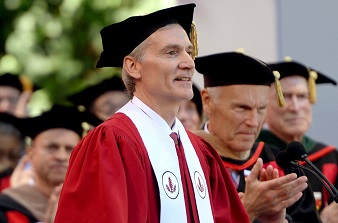Research News: Outgoing Stanford President, Neuroscientists Dr Marc Tessier-Lavigne Retracts Two Studies On Alzheimer From Science After Review
Nikhil Prasad Fact checked by:Thailand Medical News Team Sep 05, 2023 2 years, 5 months, 1 week, 1 day, 13 hours, 35 minutes ago
Research News: In a significant turn of events, outgoing Stanford University President Marc Tessier-Lavigne has retracted two research papers published in the journal Science, just as he steps down from his post. This move comes in response to questions that emerged regarding his earlier research and follows an extensive investigation conducted by the university's Board of Trustees.

The two retracted papers, both published in 2001, had gained considerable attention and citations within the scientific community, reflecting their perceived importance in the field of neurodegenerative diseases. These retractions are part of Tessier-Lavigne's commitment to address issues in his research, as he pledged to retract or correct five papers following the university's investigation findings in July.
The investigation, spurred by articles and
Research News coverages in the Stanford Daily student newspaper, scrutinized a range of research overseen by Tessier-Lavigne during his tenure, including a study from his time as a research executive at Genentech Inc. The review did identify instances of "manipulation of research data" in some of the studies, though it did not find evidence of Tessier-Lavigne falsifying results.
In the retraction notices for the two Science papers, Tessier-Lavigne stated that he proposed corrections in 2015, which were not published due to a journal error. However, upon the discovery of manipulated data during the investigation, he decided to retract them. Science acknowledged its responsibility for not posting the proposed corrections and expressed regret for the mistake.
Notably, one of the papers Tessier-Lavigne pledged to correct is a high-profile 2009 Nature paper that contributed to his reputation as a neuroscientist. The paper introduced a novel model for understanding brain cell death in Alzheimer's disease. However, this study had been marred by reproducibility issues, and Roche Holding AG terminated an Alzheimer's drug discovery program based on its findings. Tessier-Lavigne later published studies in other journals retracting some of the claims made in the original 2009 paper.
While Tessier-Lavigne did not admit to fraud, the Stanford investigation found multiple problems in the 2009 study and criticized his handling of errors in the scientific record. The Nature paper remains under investigation by the journal's editors, and Tessier-Lavigne is working with them on a correction.
Marc Tessier-Lavigne is renowned for his contributions to brain and spinal cord research, focusing on diseases like Alzheimer's and Parkinson's and developing therapies for spinal cord injuries. He co-founded Denali Therapeutics Inc., a company working on neurodegenerative disease treatments, and serves as a board member at Regeneron Pharmaceuticals Inc. Despite his resignation as president, he will continue as a professor at Stanford.
The investigation into Tessier-Lavigne's research misconduct began in December, and his resignation in July was accompanied by his acknowledgment of the need for greater diligence in addressing research errors. He expressed regret that he had not been more proactive in seek
ing corrections and taking responsibility for his lab's work.
The investigation and subsequent retractions have prompted discussions about the responsibility of research advisers, the integrity of scientific publications, and the challenges of addressing errors in research.
One unexpected aspect of the retractions was the dissenting opinion of Elke Stein, a former postdoctoral researcher who was the lead author on both retracted papers. Stein's disagreement with the retractions adds a layer of complexity to the situation. Typically, the first author of a research paper plays a significant role in conducting the experiments and collecting data. Tessier-Lavigne, listed as the last author, typically supervises the research.
The investigation identified issues with 21 figures in the two retracted Science papers, many related to the western blot technique used to detect specific proteins. Some figures contained duplicated parts of blots or combined results from multiple experiments to create a single composite image. However, the investigation found it unreasonable to expect Tessier-Lavigne to have known about these issues at the time of publication, as some manipulations were only visible with advanced image analysis tools that did not exist in the early 2000s.
Nonetheless, the investigation criticized Tessier-Lavigne for his response to the identified problems. He was informed of an image duplication issue in one of the papers as early as 2001 but did not contact Science to issue a correction. While he submitted corrections in 2015 after concerns were raised on PubPeer, they were not published, partly due to an error by the journal, but Tessier-Lavigne also stopped following up with Science after 2016.
Holden Thorp, the editor-in-chief of Science, revealed that Tessier-Lavigne reached out to him before the investigation report's release, expressing his intention to retract both studies. Thorp supported this decision, emphasizing the importance of clarity and transparency in such cases.
In the aftermath of the investigation and retractions, the scientific community has been engaged in discussions about the broader implications. The incident highlights the challenges faced by prestigious journals like Science in addressing errors in published research, the need for a more streamlined correction process, and the responsibility of researchers to actively correct the scientific record.
Science is an evolving process, and scientists, like all humans, can make mistakes. Tessier-Lavigne's willingness to take responsibility and retract flawed papers sets an example of accountability in the scientific community. As the scientific community navigates the complexities of research integrity and transparency, this case serves as a reminder of the importance of openness and diligence in advancing scientific knowledge.
For the latest
Research News, keep on logging to Thailand Medical News.
